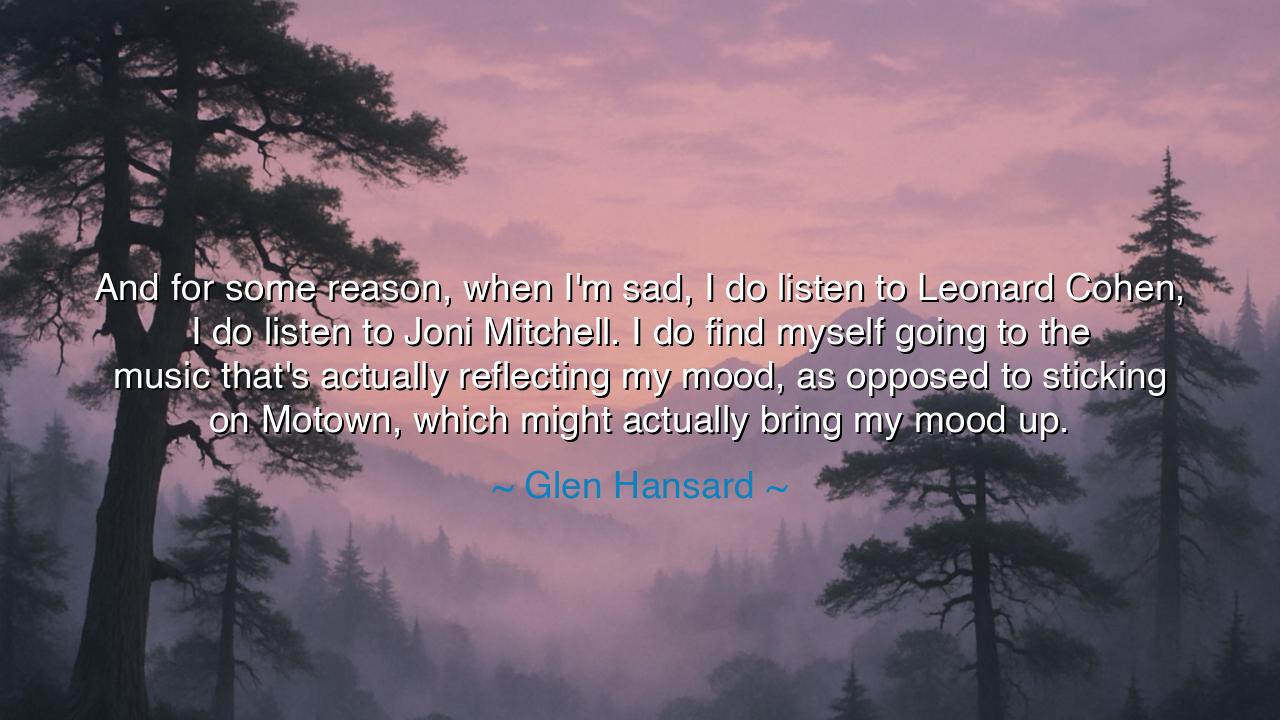
And for some reason, when I'm sad, I do listen to Leonard Cohen
And for some reason, when I'm sad, I do listen to Leonard Cohen, I do listen to Joni Mitchell. I do find myself going to the music that's actually reflecting my mood, as opposed to sticking on Motown, which might actually bring my mood up.






Hear the words of Glen Hansard, spoken with the honesty of a troubadour who has wandered through joy and despair alike: “And for some reason, when I’m sad, I do listen to Leonard Cohen, I do listen to Joni Mitchell. I do find myself going to the music that’s actually reflecting my mood, as opposed to sticking on Motown, which might actually bring my mood up.” In this reflection lies the paradox of the heart: that in sorrow, we often seek not escape, but recognition; not distraction, but communion.
For the soul in pain does not always long to be lifted suddenly into cheer, lest the joy feel false, like sunlight cast upon a storm that has not yet passed. Rather, the heart seeks resonance, a mirror in which its grief is reflected truthfully. Cohen with his gravel voice of longing, and Mitchell with her piercing honesty, offer this mirror. Their songs, drenched in melancholy, do not deny the ache but embrace it, whispering: “You are not alone. Your sorrow has been sung before.” And in that recognition, a quiet healing begins.
The ancients, too, knew this wisdom. In the theaters of Athens, citizens gathered not to laugh away their troubles, but to immerse themselves in tragedies that mirrored their own. Watching the suffering of Oedipus or Antigone, they felt their own griefs more deeply, and yet, strangely, more bearably. This was catharsis, the cleansing of the heart through shared sorrow. Hansard’s turn toward sad music in moments of sadness follows this same ancient law: sorrow must be honored before it can be released.
History is filled with such testimonies. Abraham Lincoln, haunted by a lifelong melancholy, often recited poems of grief and longing, finding in their words both companionship and solace. He did not run from the shadows of his spirit; he let the words of others hold them for him. Likewise, those who listened to the blues in the Mississippi Delta found not despair but strength, for in hearing their suffering sung, they knew it was shared. This is the origin of Hansard’s practice: that music reflecting our sorrow binds us to the long chain of human endurance.
And yet, his words carry a subtle contrast. He notes that he does not reach for Motown, though its joyful rhythms could easily lift his mood. This is not because joy is unworthy, but because imposed joy can feel hollow when the heart has not been allowed to breathe in its pain. True joy is not painted over sorrow—it grows from it, like flowers rising from fertile soil. The path through grief often requires first dwelling in it, letting it resonate, before one can step into laughter that feels whole and true.
The lesson here is clear: when sadness comes, do not be ashamed to sit with it. Let it be named, let it be sung. Seek out the art, the poems, the songs that mirror your spirit. By doing so, you give your pain dignity, and you allow the voices of others—whether Cohen, Mitchell, or countless unnamed poets—to share your burden. Only then, when sorrow has been honored, will the music of joy feel genuine again.
So let Hansard’s words be remembered as both comfort and command: when you are sad, listen not to what denies your grief, but to what reflects it. For in that reflection you will find kinship, and in kinship, strength. This is the way of the artist, the way of the human spirit—to turn sorrow into song, and to discover that even in the darkest night, you are never truly alone.






AAdministratorAdministrator
Welcome, honored guests. Please leave a comment, we will respond soon